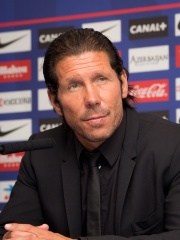
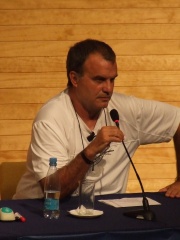
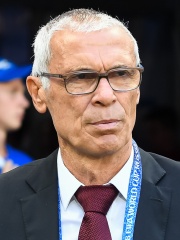
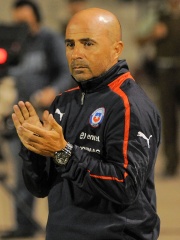
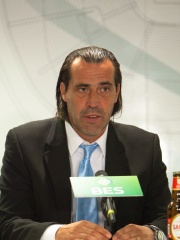

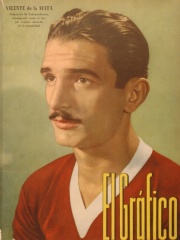
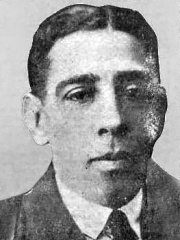
The Most Famous
COACHES from Argentina
Top 10
The following people are considered by Pantheon to be the top 10 most legendary Argentinean Coaches of all time. This list of famous Argentinean Coaches is sorted by HPI (Historical Popularity Index), a metric that aggregates information on a biography's online popularity. Visit the rankings page to view the entire list of Argentinean Coaches.

1. Diego Simeone (b. 1970)
With an HPI of 73.34, Diego Simeone is the most famous Argentinean Coach. His biography has been translated into 59 different languages on wikipedia.
Diego Pablo Simeone González (Spanish pronunciation: [ˈdjeɣo ˈpaβlo simeˈone]; Italian: [ˈdjɛːɡo simeˈoːne, ˈdjeː-]; born 28 April 1970), nicknamed "Cholo" ([ˈtʃolo]), is an Argentine professional football manager and former player who played as a midfielder. He has been the manager of La Liga club Atlético Madrid since December 2011, making him the second longest serving manager in Europe currently. He is considered one of the best managers of the 21st century. In his club career that started in 1987, Simeone played in Argentina, Italy, and Spain for Vélez Sarsfield, Pisa, Sevilla, Atlético Madrid, Inter Milan, Lazio and Racing Club. He won a domestic double with Atlético Madrid in 1996, and the UEFA Cup with Inter in 1998, also winning another domestic double with Lazio in 2000, as well as the 1999 UEFA Super Cup and the 2000 Supercoppa Italiana. Simeone was capped over 100 times for the Argentina national team and represented the country at the 1994, 1998, and 2002 FIFA World Cups, and in four editions of the Copa América, winning the tournament in 1991 and 1993. He also won the FIFA Confederations Cup in 1992, the 1993 Artemio Franchi Cup, and a silver medal at the 1996 Summer Olympic games. As a manager, Simeone has coached Argentine sides Racing Club, Estudiantes, River Plate, San Lorenzo and Italian club Catania, before joining Spanish club Atlético Madrid in 2011. He won the Argentine Primera División both with Estudiantes and River Plate. Simeone has had his biggest managerial success with Atlético Madrid, turning the team into a competitor for the La Liga and breaking the Real Madrid–Barcelona duopoly. He has won La Liga twice, the Copa del Rey, two UEFA Europa Leagues, two UEFA Super Cups, as well as being runner-up of the UEFA Champions League twice. Simeone is the longest-serving manager in La Liga, having stayed for well over a decade at Atlético. He won Atléti their first derby against arch-rivals Real Madrid in 14 years in the 2013 Copa Del Rey final at the Santiago Bernabeu.

2. Marcelo Bielsa (b. 1955)
With an HPI of 68.98, Marcelo Bielsa is the 2nd most famous Argentinean Coach. His biography has been translated into 45 different languages.
Marcelo Alberto Bielsa Caldera ([maɾˈselo alˈβeɾto ˈβjelsa], nicknamed El Loco Bielsa [ˈloko ˈβjelsa], meaning 'The Madman Bielsa'; born 21 July 1955) is an Argentine professional football manager who is the current manager of the Uruguay national team. He is widely regarded as one of the most influential coaches of all time. Bielsa played as a defender for Newell's Old Boys, Instituto, and Argentino de Rosario. Bielsa played as a defender in Newell's Old Boys' First Division team and was a member of Argentina U23 in the 1976 Pre-Olympic Tournament, but retired when he was 25 to focus on coaching. Bielsa has managed several football clubs and also the national teams of Argentina and Chile. He developed his career as coach of Newell's Old Boys where he won several titles in the early 1990s, before moving to Mexico in 1992, briefly coaching Club Atlas and Club América. Bielsa returned to Argentina in 1997 to manage Vélez Sarsfield, leading them to the 1998 league title (Clausura). His personality and gestures during his stint in Chile captured the attention of media and unleashed a series of minor controversies both in sports and politics. He had a two year-spell in Spain at Athletic Bilbao between 2011 and 2013, leading them to domestic and continental cup finals in the first season, though they lost both. In May 2014, Bielsa was appointed coach of Marseille, starting with good results but finishing outside the expected first three places in Ligue 1, resigning after just over a year at the French club. He remains highly regarded by OM fans for his offensive playing style and personality. In June 2018, Bielsa was appointed manager of then-Championship club Leeds United, leading the club to promotion back to the Premier League in 2020 after a 16-year absence as a result of winning the 2019–20 EFL Championship. Leeds United is the club at which he spent the most time as manager in his career, taking charge of 170 games before departing in February 2022. He is considered a cult figure among Leeds fans. In 2023, he became manager of Uruguay, becoming only the second non-Uruguayan manager to coach the team. He led Uruguay to two record-breaking wins against Brazil and Argentina before subsequently achieving qualification for the 2026 FIFA World Cup.

3. Héctor Cúper (b. 1955)
With an HPI of 68.39, Héctor Cúper is the 3rd most famous Argentinean Coach. His biography has been translated into 38 different languages.
Héctor Raúl Cúper (Spanish pronunciation: [ˈeɣtoɾ ˈkupeɾ]; born 16 November 1955) is an Argentine football manager and former player who was most recently head coach of the Syria national team. As a player, he was a defender who spent most of his career at Ferro Carril Oeste, where he played 463 games. His nickname was "Cabezón" ("Big head"). He made his managerial breakthrough at Mallorca, reaching the Copa del Rey final in 1998 and the final of the UEFA Cup Winners' Cup a year later, as well as a best-ever third-place finish. In two years at Valencia, he reached the UEFA Champions League final twice, earning a move to Italy's Internazionale in 2001. Cúper also managed Betis and Racing Santander in La Liga, and Parma in Serie A. He later coached the national teams of Georgia, Egypt, Uzbekistan and DR Congo, taking the second of those countries to the 2017 Africa Cup of Nations final and a place at the 2018 FIFA World Cup.

4. Jorge Sampaoli (b. 1960)
With an HPI of 66.87, Jorge Sampaoli is the 4th most famous Argentinean Coach. His biography has been translated into 40 different languages.
Jorge Luis Sampaoli Moya (Spanish pronunciation: [ˈxoɾxe sampaˈoli]; born 13 March 1960) is an Argentine football coach who is the head coach of Campeonato Brasileiro Série A club Atlético Mineiro. Sampaoli started out as a youth player and eventually switched to management after a severe injury. Sampaoli started with an impressive coaching run at Coronel Bolognesi of Peru in 2004, and continued with brief but successful terms at O'Higgins of Chile and Emelec of Ecuador. Sampaoli earned praise as the head coach of Universidad de Chile, winning three league titles and the Copa Sudamericana championship. This success led him to coach the Chilean men's national team in 2012, replacing Claudio Borghi. He led the Chile national football team to their first Copa América title, after defeating Argentina in the final in the 2015 tournament in Chile. He is well known for his attacking tactics which are similar to those of Marcelo Bielsa, according to the press and fans alike. On 28 June 2016, Sampaoli signed a two-year contract with Sevilla. After spending only one year in Spain and leading Sevilla to fourth spot in La Liga, and ensuring Champions League football the following season, Sampaoli left the club to coach the Argentina national team, where he left by mutual consent, after a disappointing run in the 2018 FIFA World Cup. He eventually agreed to coach Brazilian club Santos in 2019, staying one year and leading the club to the second position in the league. In March 2021, he returned to manage in European football when he was appointed at French side Marseille. In October 2022, he returned to manage Sevilla. On 21 March 2023, he was sacked by Sevilla and replaced by José Luis Mendilibar. He returned to French football and was appointed manager of Rennes in November 2024 but was sacked in January 2025.
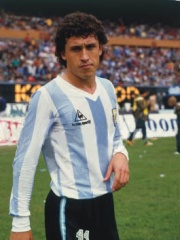
5. Jorge Valdano (b. 1955)
With an HPI of 66.57, Jorge Valdano is the 5th most famous Argentinean Coach. His biography has been translated into 48 different languages.
Jorge Alberto Francisco Valdano Castellanos (born 4 October 1955) is an Argentine former football player, coach, and the former general manager of Real Madrid. He is currently working as a commentator for beIN Sports. Nicknamed "The Philosopher of Football", he played as a forward. With the Argentina national team, Valdano took part at the 1975 Copa América as well as the 1982 and 1986 FIFA World Cups, the latter of which Argentina won. He had a major influence in the 1986 win, scoring four goals in the tournament, including Argentina's second goal against West Germany in the final. In total, he earned 23 caps for his nation between 1975 and 1990, scoring seven goals. Although he initially played for Newell's Old Boys, Alavés and Real Zaragoza, his most successful period at club level was at Real Madrid, where he won La Liga twice, the Copa de la Liga and two UEFA Cups. As a manager, he coached Spanish sides Tenerife, Real Madrid and Valencia. Considered a benchmark for the way he addressed various football clubs, Valdano participated in 2013 at the World Leadership Forum and in the World Business Forum in Mexico City, where he associated the world of sports and business behind it, where he listed the 11 powers of leadership, based on his last book.

6. Sergio Batista (b. 1962)
With an HPI of 59.87, Sergio Batista is the 6th most famous Argentinean Coach. His biography has been translated into 34 different languages.
Sergio Daniel "Checho" Batista (Spanish pronunciation: [ˈseɾxjo ðaˈnjel ˈtʃetʃo βaˈtista]; born 9 November 1962) is an Argentine football manager and former international player for Argentina. As a footballer he played as a midfielder for Argentinos Juniors, River Plate, Nueva Chicago, Tosu Futures and All Boys. He represented his national team 39 times from 1985 to 1990 where the team won the 1986 FIFA World Cup. After retiring he moved into coaching with Bella Vista before returning to his former club Argentinos Juniors, as well as spells at Talleres, Nueva Chicago and Godoy Cruz. He led the Argentine Olympic team to the gold medal in the 2008 Olympics, which led to him being head coach of the Argentina national football team from July 2010 to July 2011.

7. Roberto Sensini (b. 1966)
With an HPI of 58.49, Roberto Sensini is the 7th most famous Argentinean Coach. His biography has been translated into 32 different languages.
Roberto Néstor Sensini (born 12 October 1966) is an Argentine football manager and former player, who played as a centre-back or defensive midfielder. As a player with the Argentina national team, he finished third place in the 1989 Copa América edition of the tournament. He also represented his nation in the 1990, 1994 and 1998 FIFA World Cup finals, finishing in runner-up at the 1990 World Cup. Furthermore, he won an Olympic silver medal with Argentina at the 1996 Olympics.

8. Vicente de la Mata (1918 - 1980)
With an HPI of 56.31, Vicente de la Mata is the 8th most famous Argentinean Coach. His biography has been translated into 18 different languages.
Vicente de la Mata (15 January 1918 – 4 August 1980) was an Argentine football player and manager. A forward, he played most of his club career for Independiente and for the Argentina national team between 1937 and 1946.

9. José Durand Laguna (1885 - 1959)
With an HPI of 55.08, José Durand Laguna is the 9th most famous Argentinean Coach. His biography has been translated into 17 different languages.
José Manuel Durand Laguna (November 7, 1885 – February 1, 1965) was an Argentine football player and manager. Laguna was born in Salta, Argentina, and died, aged 79, in Asunción, Paraguay.
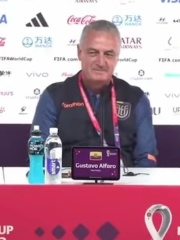
10. Gustavo Alfaro (b. 1962)
With an HPI of 53.85, Gustavo Alfaro is the 10th most famous Argentinean Coach. His biography has been translated into 22 different languages.
Gustavo Julio Alfaro (born 14 August 1962) is an Argentine football manager and former player who manages the Paraguay national football team. Although Alfaro had a short career as a footballer, he was captain of the Atlético de Rafaela when they were promoted to the Argentine Primera División in 1989. Alfaro retired as a player from football in 1992 to concentrate on his coaching career. His first league title came with Arsenal de Sarandí in the 2012 Clausura. At international level, he coached Ecuador at the 2022 FIFA World Cup before a stint in charge of Costa Rica. He was appointed as Paraguay coach in 2024 and led them to qualification for the 2026 World Cup.
People
Pantheon has 13 people classified as Argentinean coaches born between 1885 and 1973. Of these 13, 11 (84.62%) of them are still alive today. The most famous living Argentinean coaches include Diego Simeone, Marcelo Bielsa, and Héctor Cúper. The most famous deceased Argentinean coaches include Vicente de la Mata, and José Durand Laguna. As of April 2024, 1 new Argentinean coaches have been added to Pantheon including Carlos Bossio.
Living Argentinean Coaches
Go to all RankingsDiego Simeone
1970 - Present
HPI: 73.34
Marcelo Bielsa
1955 - Present
HPI: 68.98
Héctor Cúper
1955 - Present
HPI: 68.39
Jorge Sampaoli
1960 - Present
HPI: 66.87
Jorge Valdano
1955 - Present
HPI: 66.57
Sergio Batista
1962 - Present
HPI: 59.87
Roberto Sensini
1966 - Present
HPI: 58.49
Gustavo Alfaro
1962 - Present
HPI: 53.85
Leonardo Astrada
1970 - Present
HPI: 47.07
Jorge Amado Nunes
1961 - Present
HPI: 44.55
Carlos Bossio
1973 - Present
HPI: 39.88




